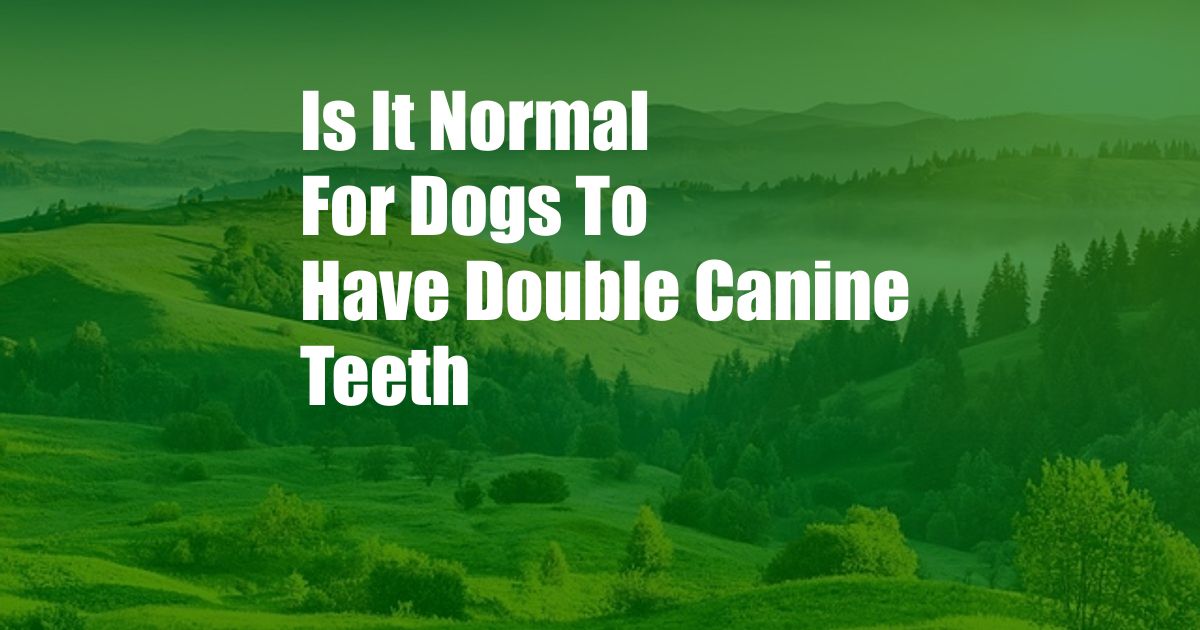
Is It Normal for Dogs to Have Double Canine Teeth?
As a dog owner, I was shocked to discover that my beloved pup had double canine teeth. The extra teeth appeared as tiny spikes behind his regular canines, and I couldn’t help but wonder if something was wrong.
My vet assured me that double canine teeth are a common condition in dogs, known as “retained deciduous teeth.” He explained that during puppyhood, dogs grow two sets of canine teeth: baby teeth and adult teeth. Sometimes, the baby canine teeth fail to fall out when the adult teeth erupt, resulting in double canines.
What Causes Double Canine Teeth in Dogs?
There are several possible causes of retained deciduous teeth in dogs:
- Genetics: Some breeds are more prone to double canine teeth than others. Small breeds, such as Chihuahuas and Yorkshire Terriers, are particularly susceptible.
- Jaw size: Dogs with small jaws may not have enough space for all their teeth to fit properly, leading to retained baby teeth.
- Trauma: Injury to the mouth can damage the adult canine tooth, preventing it from erupting and causing the baby canine to remain in place.
Signs and Symptoms of Double Canine Teeth
Double canine teeth can present with various signs and symptoms:
- Misaligned teeth: The extra canine teeth can push against the other teeth, causing misalignment and crowding.
- Gum disease: The presence of extra teeth can create pockets where bacteria can accumulate, leading to gum inflammation and infection.
- Bad breath: The bacteria trapped between the double canine teeth can produce foul-smelling gases, causing bad breath.
- Eating difficulties: Misaligned teeth can make it difficult for dogs to chew properly, leading to eating problems.
Treatment Options for Double Canine Teeth
The treatment for double canine teeth depends on the severity of the condition and the individual dog’s needs. Options may include:
- Extraction: If the extra canine tooth is causing discomfort or problems, the veterinarian may recommend extracting it.
- Orthodontics: In some cases, orthodontics can be used to realign the teeth and create space for the adult canine tooth to erupt.
- Monitoring: If the double canine teeth are not causing problems, the veterinarian may recommend monitoring the situation and intervening only if necessary.
Tips and Expert Advice for Handling Double Canine Teeth
Here are some tips and expert advice for dealing with double canine teeth in dogs:
- Regular Veterinary Check-ups: Have your dog’s teeth checked by a veterinarian regularly to monitor double canine teeth and prevent any potential problems.
- Home Dental Care: Brush your dog’s teeth regularly to remove plaque and prevent gum disease. This is especially important if your dog has double canine teeth.
- Dental Treats: Use dental treats designed to promote oral health and reduce tartar buildup.
- Check Your Dog’s Chewing Habits: If your dog chews on hard objects, provide safe and appropriate chewing toys to prevent damage to the extra teeth.
Frequently Asked Questions About Double Canine Teeth in Dogs
- Q: Can double canine teeth cause pain?
A: Yes, double canine teeth can cause discomfort and pain if they push against the other teeth or become infected.
- Q: What happens if double canine teeth are left untreated?
A: Untreated double canine teeth can lead to misalignment, gum disease, bad breath, and eating difficulties.
- Q: How can I prevent double canine teeth in my dog?
A: While there is no way to completely prevent double canine teeth, maintaining good oral hygiene and regular dental check-ups can reduce the risk.
Conclusion
Double canine teeth in dogs are a common condition that can affect any breed. Understanding the causes, signs, and treatment options can help dog owners make informed decisions about their pet’s oral health.
Remember, regular veterinary check-ups and proper home dental care are essential for preventing and managing any dental problems, including double canine teeth. If you have any concerns about your dog’s teeth, consult with your veterinarian for personalized advice and treatment.
Is this topic of interest to you? Share your thoughts and experiences in the comments below.